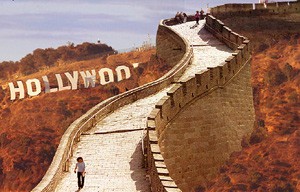No longer content simply to build movie sets and provide extras in Hollywood films, Chinese film studios are moving up in the value chain. Partnering with American studios, they are helping develop, design and produce world-class films and animated features. With a bigger role in the creative process they are reaping more financial and artistic rewards.
“Kung Fu Panda 3” is the first collaboration between Hollywood’s DreamWorks Animation and its Chinese partner, Oriental DreamWorks. Partly owned by a government investment fund and private equity firm China Media Capital, Oriental DreamWorks employs mostly graduates of China’s leading arts schools. They contribute to the movie by adding Chinese elements, creating storyboards and building parts of the 3-D digital sets.
and its Chinese partner, Oriental DreamWorks. Partly owned by a government investment fund and private equity firm China Media Capital, Oriental DreamWorks employs mostly graduates of China’s leading arts schools. They contribute to the movie by adding Chinese elements, creating storyboards and building parts of the 3-D digital sets.
“We’re trying to develop Chinese creative talents,” says James Fong, the chief executive of Oriental DreamWorks.
It is part of a broader push by China Media Capital into the entertainment business. Over the last few years, the investment firm has made deals with Warner Bros. and the IMAX Corporation of Canada. It also helped develop a Chinese version of the hit TV show “The Voice.” With government backing, China Media brought in new partners to develop a $3.1 billion “Dream Center,” a cultural and entertainment district in Shanghai with theaters, performance halls, restaurants and shops.
For American companies, such collaborations offer access to new talent and the chance to understand better a culture that will increasingly be portrayed in its films. And coproduction deals provide greater access to China’s tightly regulated market, which in a few years is expected to surpass the United States as the world’s biggest film market.
The Chinese government is supporting the deals, seeing them as part of a broader “soft power” push aimed at enhancing the country’s image and the way its people and culture are depicted on the big screen, at home and abroad. As global filmmakers look to gain entry to the market, they must now consider the tastes and preferences of a Chinese audience, not to mention the wishes of the ruling Communist Party.
depicted on the big screen, at home and abroad. As global filmmakers look to gain entry to the market, they must now consider the tastes and preferences of a Chinese audience, not to mention the wishes of the ruling Communist Party.
Despite China’s big ambitions, it remains to be seen whether the nation’s culture is found appealing by the rest of the world. While the US’ economic dominance bears some of the responsibility for Hollywood’s success, the appeal of American culture is mostly to blame. International and constantly morphing since its beginnings, American art is an amalgamation of art of the whole world, from Europe to Africa.
Source: http://www.nytimes.com/2015/04/06/business/media/china-escalates-hollywood-partnerships-aiming-to-compete-one-day.html?_r=1
I’ve not tried to show feature films this year, but there are certainly many that “translate” across cultures, even if as an American I miss some of the details. In Hollywood products it’s clear who the villains are, but “outsiders” (including people who don’t watch a lot of films, such as me) may miss cues from the costumes that either confirm or clash with the role, or “quote” another well-known film. My sense, in other words, is that writers/directors/producers/actors partake in a global film culture. While Bollywood may have its own conventions, the more sophisticated films “quote” other films from France or the US or elsewhere that “insiders” get. Perhaps someone who is a film aficionado can comment?
The co-production angle is neat. Of course most (hopeful!) blockbusters are horribly expensive yet many flop. Risk-sharing strategies thus abound. Cross-national co-production is one of those, I know of several that were joint US-Japan productions and I’m sure there are many others with continental Europe. There are also lower-level appeals in the form of films that are primarily “American” or “Japanese” but that use stars from another country to enhance their draw in other markets.
One final item: censorship, self or external. Many good films are “edgy” – but will Chinese authorities be willing to say “OK” to films that intend to make them (and everyone else!) uncomfortable?
See the earlier post based on the same NYTimes article:
https://econ274.academic.wlu.edu/2015/04/the-rise-of-chinas-film-making-industry/#comment-66796
I cannot see how a Chinese “Hollywood” could ever seriously compete in the near future. The world (for the most part) is attracted to our culture, something that the Chinese culture globally lacks. Perhaps later down the road Hollywood will have a competitor.
I believe it will take at least another decade or two for China to seriously challenge Hollywood’s status in worldwide entertainment. As mentioned in the post, there are cultural differences that must be seriously considered when evaluating China’s potential as a competitor in the filmmaking business. There is still the common viewpoint that central government does not provide an environment that is well-suited to foster artistic creativity.